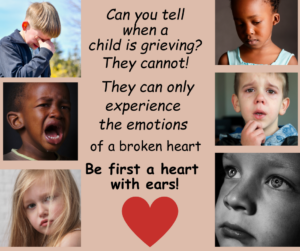
Developing emotionally healthy children requires persistence, patience and loving support!
Facts to Remember:
- Grief is a Natural and Normal Response to losses or changes in Life.
- It affects Children’s energy, attitudes, and behaviors in ways they cannot understand.
- Busy family schedules without regular purposeful communication can negatively affect Children’s Mental and Physical Health.
- Parental observations can be achieved during scheduled times for dialogue in relaxed family events. This practice will create special memories and a sense of Family closeness and will have life-long benefits for all to enjoy.
Grief is an inevitable part of life, yet it remains one of the most challenging experiences to navigate—especially for children. As parents, our instinct is to shield our little ones from pain, but the reality is that loss is a part of life, and learning to process grief healthily is essential for emotional resilience. Teaching children how to cope with loss not only helps them navigate personal hardships but also equips them with lifelong skills to manage adversity.
Understanding How Children Process Grief
Children experience grief differently than adults. Depending on their age and developmental stage, they may struggle to fully understand the permanence of loss or express their emotions verbally. Here are some common ways children process grief:
Young Children (Ages 3-6): They may have a limited understanding of death and see it as temporary or reversible. Their grief might manifest through play, changes in behavior, or regression to earlier developmental stages.
School-Age Children (Ages 7-12): They begin to grasp the finality of death and may experience sadness, guilt, or even anger. Their grief may surface through school performance issues, withdrawal, or mood swings.
Teenagers (Ages 13-18): Adolescents often experience grief similarly to adults but may struggle with expressing vulnerability. They might seek peer support, engage in risky behaviors, or question life’s fairness and meaning.
Understanding these differences allows parents to provide age-appropriate support and ensure their child feels heard and understood.
Creating a Safe Space for Emotional Expression
One of the most powerful things a parent can do is create a safe and supportive environment where their child feels comfortable expressing emotions. Here’s how:
Encourage Open Conversations: Let your child know that all emotions—sadness, anger, confusion—are valid. Use age-appropriate language to explain what has happened and encourage them to ask questions.
Use age-appropriate language to explain what has happened and encourage them to ask questions.
Model Healthy Grieving: Children look to their parents for cues on how to handle loss. If they see you healthily expressing your emotions, they will feel more comfortable doing the same.
Listen Without Judgment: Sometimes, children may say things that seem unusual or even inappropriate when trying to process grief. Instead of correcting them immediately, allow them to express themselves fully and provide gentle guidance afterward.
Teaching Coping Strategies
Grief can be overwhelming, but equipping children with coping strategies can help them process their emotions constructively:
Art and Writing: Encourage them to draw pictures, write letters, or keep a journal about their feelings.

Physical Activity: Exercise and outdoor play can help release built-up stress and emotions.
Rituals and Remembrance: Allow children to participate in memorial activities, such as lighting a candle, creating a memory book, or planting a tree in honor of their loved one.
Mindfulness and Relaxation Techniques: Teaching deep breathing exercises, meditation, or simple relaxation techniques can help children regulate their emotions.
Providing Stability and Reassurance: Grief can make the world feel unpredictable and frightening for children.
Maintaining routines and providing consistent reassurance can help them feel secure during difficult times.
Stick to Daily Routines: Keeping up with regular mealtimes, school schedules, and bedtime rituals provides a sense of normalcy.
Offer Physical Comfort: Hugs, cuddles, or simply holding their hand can offer profound emotional reassurance.
Remind Them They Are Loved: Reiterate that they are safe, loved, and not alone in their grief.
When to Seek Professional Help
While grief is a natural process, some children may need additional support. If your child exhibits prolonged depression, withdrawal, drastic behavioral changes, or expressions of self-harm, it may be time to seek professional help from a counselor or therapist.
Be encouraged!
Grief is never easy, but helping children develop healthy coping mechanisms ensures they grow into emotionally strong and resilient individuals. As parents, our role is not to erase their pain but to guide them through it with love, patience, and understanding. By fostering open conversations, providing coping strategies, and ensuring they feel supported, we can help our children face life’s inevitable losses with courage and grace. Helping them during their times of grief will strengthen the parent-child relationship with lifelong benefits. Remember, we are here to help!
